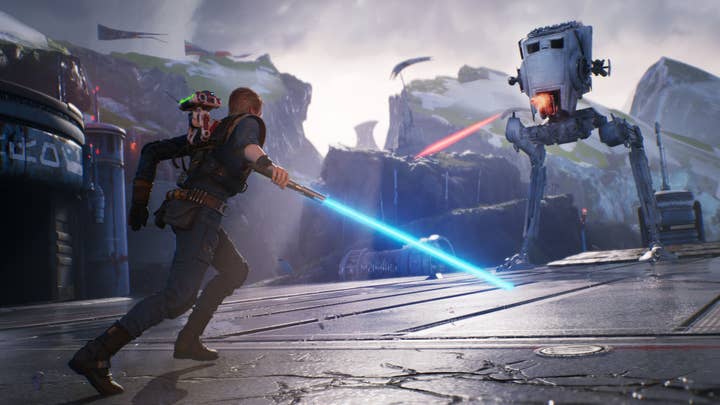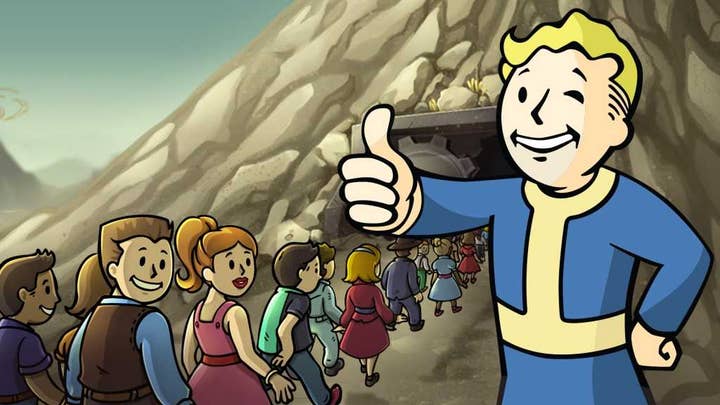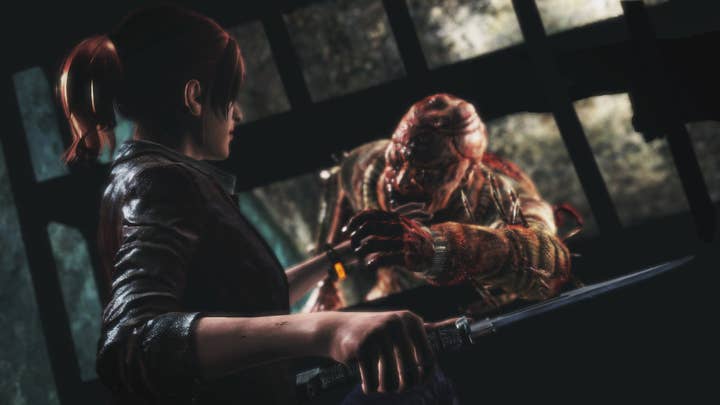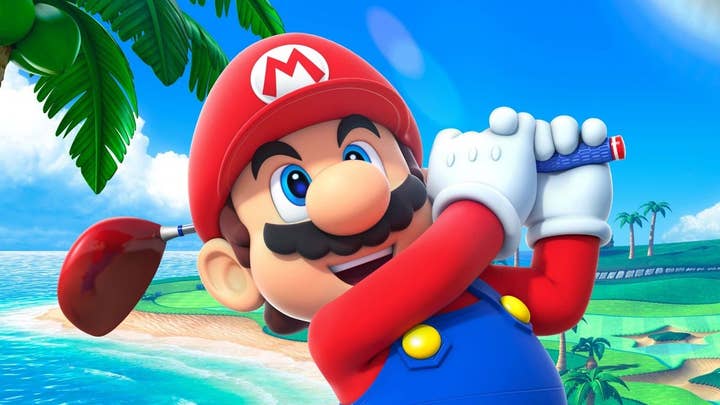Are publishers doing enough with their brands? | Opinion
EA hasn't produced much with the Star Wars brand, and it's not alone among publishers in the west -- it's high time they took some lessons from Japan
In November 2013, Disney shut down LucasArts, the in-house videogame department at Lucasfilm, and signed an exclusive deal with Electronic Arts to have the publisher produce new Star Wars games for the next ten years. At the time, EA CFO Blake Jorgensen made the following statement:
"[Disney] came to us because of our partnership and they knew that we could help them develop really great games, and we struck what we believe is a fantastic deal, which allows us to be able to build games in many different genres across multiple types of platforms over ten years, and we'll leverage the strength of the Disney marketing associated with the Star Wars properties both in movies and other things that they may do over the timeframe."
Since signing its exclusive deal with Disney six years ago, EA has produced just three major Star Wars games to date. Two have been online-focused shooters, both released to mixed receptions. The second of these, Star Wars Battlefront II, went on to sell over nine million units and still fell short of internal expectations both in terms of unit sales as well as revenue -- owing to a controversy around its loot box and microtransaction-heavy business model. It also wiped out around $3 billion in EA stock after investors became aware that the company had managed to anger a remarkably large swath of its customers.
"A couple of big-budget titles are a necessity, but your portfolio doesn't need to be restricted to those"
A third game that was in production -- first at Visceral Games, then later rebooted by EA Vancouver -- was cancelled last year, with sources at EA stating that the company never really believed in the project to begin with. It was meant to be a big-budget, single-player, story-driven affair overseen by Uncharted and Soul Reaver director Amy Hennig, but EA was reportedly reluctant to throw its dollars behind something that wasn't built around an ongoing monetisation model. In its place, EA produced Star Wars Jedi: Fallen Order, a single-player title developed by Respawn Entertainment, which launched last month.
Here's the thing about Fallen Order: while it sits at a respectable 80% on Metacritic, there's an overwhelming sense of "safeness" about the game. There are Force powers. There are lightsaber battles. There are Metroidvania elements. There's some light puzzle-solving. There are the obligatory inspirations from Dark Souls. It's good, but it isn't particularly inspired.
And so, six years after a much-publicized deal that was meant to revolutionise Star Wars and give us games in "many different genres across multiple types of platforms," we've got two not-so-great games, one good game, a couple of mobile games, and a half-hearted attempt to revive Star Wars: The Old Republic -- an MMORPG that was released eight years ago. While the EA/Disney deal lasts until 2023 and there's still time to course-correct, one would imagine this isn't the outcome EA, Disney, or Star Wars fans had hoped for.
The question is: how did this happen?

The answer is actually fairly simple. It happened because EA didn't really attempt to develop games in "many different genres across multiple types of platforms" to begin with. It developed two very expensive games in a very popular, highly competitive genre. In the process, it shut down a third very expensive game (twice) that actually was going to be in a different genre, and eventually replaced it with a slightly less expensive game that, by all accounts, is a solid product that ticks all the boxes after years of Star Wars drought -- but not much more. In summary: EA put all its eggs in one basket, and then dropped the basket.
"Diversity is good. Reaching out to different audiences is good. Not having everything cost $100 million is good"
Now, it's easy to point fingers and claim one would have known what the better course of action was, especially if you grew up on Star Wars in the '90s. Back when games like Jedi Knight, Rogue Squadron, and Star Wars Episode I: Pod Racer could comfortably co-exist and each find healthy audiences. Let's be clear -- it isn't easy to make high-level decisions about a multi-billion dollar brand.
That having been said, is it really all that difficult to figure out what to do with Star Wars? Especially when you've been in this business as long as EA has? When you've just signed an exclusive deal with one of the biggest brands in the history of entertainment? Isn't the wiser -- and more practical -- approach simply to do everything? To create a large number of games across different genres, aimed at different audiences, and see what sticks? Big games. Small games. Shooters. Racing games. Fighting games. Flying games. Retro-styled indie throwbacks. It's Star Wars. Why can't you just... do a bit of everything?
A couple of big-budget, tentpole titles are a necessity, but your portfolio doesn't need to be restricted to those. Diversity is good. Reaching out to different audiences is good. Being able to put games out more frequently is good. Not having everything cost $100 million is good.
EA isn't the only major publisher to have made this mistake. According to a report by Kotaku, Blizzard's Diablo IV has been rebooted twice and the game revealed at Blizzcon in November was the company's third attempt to create something worthy of the Diablo name. Now, while Blizzard has famously been known to reboot and iterate until it gets products just right, the problem in this case was that it had nothing substantial to present the (sizeable) Diablo community for years.
"Letting people engage with your brand in varied, exciting ways is something most western publishers simply aren't very good at"
Notably, a second expansion for Diablo III, which would have kept the torch lit until Diablo IV's release, was cancelled early in development, and the team moved to the more expensive, time-consuming Diablo IV project instead. These decisions culminated in the Diablo Immortal fiasco last year, when BlizzCon attendees turned up at the annual convention expecting to witness a reveal of a Diablo 4 -- or at the very least, a remaster of an older Diablo game to tide them over -- but sat through the reveal of a free-to-play mobile game developed by a Chinese company instead. It wasn't one of Blizzard's best days, and it took an entire year before it was able to course-correct in the eyes of its fans.
Things aren't much better now that Diablo IV has been revealed either. The game has no release window, and is likely a couple of years away. In the meantime, Diablo III's seasonal events will continue but there's no major content being developed to keep its community engaged. If there is anything Diablo-related for fans to look forward to over the next year or so, Blizzard isn't talking about it. No remaster of Diablo II, no substantial content additions to Diablo III, no spin-off games, no Netflix shows. Just a free-to-play mobile game aimed primarily at the lucrative Chinese market.

Letting people engage with your brand in varied, exciting ways of different shapes and sizes is an important part of doing business, and it's something most western publishers simply aren't very good at. Bethesda's Fallout Shelter comes to mind as a recent exception -- a smart investment on the company's part in case the Fallout '76s don't pan out. Unfortunately, most mobile efforts tend to be more along the lines of the much maligned Elder Scrolls: Blades than Fallout Shelter, and that's where western publishers are missing the point.
Japanese publishers, on the other hand, are practically experts in the art of brand management. Whether it's Nintendo or Atlus or Square Enix or Capcom, most major Japanese publishers have been in the habit of exploring different genres and formats with their brands for years. They each have different terms for the practice, too. Square Enix used to refer to it as "polymorphic content." Capcom calls it their "single content, multiple usage" strategy. And in the case of the Nintendo, it doesn't have a name because, well, it's just a regular part of their usual business practices. Here's how that's worked out for them:
If the numbers above look healthy for those smaller games, it's because they are. Nintendo has an extremely efficient development pipeline established across its partner studios, and this allows it to keep up the high level of output it has enjoyed over the years. If there's no new big-budget 3D Mario platformer on the horizon, chances are you'll get a Mario Golf or a Mario Tennis or a Mario Maker instead (and we aren't even counting Mario Kart). Nintendo always has multiple development teams working on multiple games across most of its major brands, whether that's Mario or Zelda or Animal Crossing or Fire Emblem. Maybe it's time western publishers began doing the same -- and not just in the form of throwaway mobile games, but something substantial that fans can rally around.
"If there's no new big-budget Mario platformer on the horizon, chances are you'll get a Mario Golf or a Mario Tennis or a Mario Maker"
Capcom is another good example of brand management. In the case of Capcom, the Resident Evil: Revelations series of spin-off games has been particularly successful. The first Revelations, designed as a "back-to-horror" approach to the series, was developed for the Nintendo 3DS on a fraction of the budget devoted to Resident Evil 6. In addition to being a strong standalone game, Revelations quickly became part of the broader conversation about the future of Resident Evil, and played a major role in the brand eventually returning to its survival-horror roots.
Cut to 2019 and Capcom is still porting and re-releasing the game for modern platforms. As a result, Revelations has sold over 1.9 million units, while Revelations 2 has sold over 2.4 million units globally. Both games were a smart investment and continue to pay dividends today -- and they aren't the only ones. Capcom has practically turned updating and re-releasing its back catalogue of games and spin-offs into a business model of its own. Mega Man in particular has benefited immensely from its various off-shoots over the years.

And then there's Atlus, the developer behind the now-popular Persona series of role-playing games. As any die-hard Atlus fan will tell you, Persona began as a branch of the company's incredibly niche Shin Megami Tensei franchise. Over the years, Atlus spun Shin Megami Tensei off into a variety of branching ideas, from traditional RPGs to action RPGs to strategy RPGs to school life-simulation RPGs. It eventually struck gold with that last one, which culminated in Persona 5 having sold over 3.2 million units globally -- a success far beyond any other game in Atlus history. Even today, Atlus continues to explore new and interesting ideas using the essence of Shin Megami Tensei as a base -- see: Tokyo Mirage Sessions #FE)
"Does anyone really think a witty, whacky Sony-themed kart racer wouldn't do reasonably well at the right budget?"
There's really no reason publishers in the west shouldn't be able to do similar things with their own IP. Take Uncharted -- people have been joking about "Unkarted" for years, and really, why not? Does anyone really think a witty, whacky Sony-themed kart racer wouldn't do reasonably well, provided it were developed on an appropriate budget? At the end of the day, Kratos is as much of a mascot character as Mario and Link are. There are no hard-and-fast rules about what you can or can't put him in, as long as you stick to the general characteristics that make Kratos recognizable.
Other mascots are even easier to work with, like Doomguy. What prevents Id Software from working with another studio to put out a 2D run-and-gun Doom platformer? Or Sub-Zero and Scorpion, in the case of Netherrealm Studios? Where's that Mortal Kombat Mythologies remake? Again, variety is good. Branching out is good. Fewer $100 million budgets is good.
Some western publishers are already equipped to do this. Take Ubisoft. There's no real reason Assassin's Creed shouldn't be able to branch out into multiple genres -- not with the large number of studios Ubisoft is able to deploy year after year. Maybe allow one of them to try something new, or bring an external studio aboard to explore different genres. The Rabbids series worked. Maybe an empire-building game set in the Assassin's Creed universe could, too. The same goes for a number of the studios Sony Interactive Entertainment has shut down over the years. Is one honestly to believe that Studio Liverpool, the developer behind some of the best racing games ever made, had nothing left to contribute to Sony's first-party slate?
This, of course, opens up a larger conversation about the viability of "AA" games in today's market. The truth is that "AA" has never been more alive than now. The sheer number of independent developers working on exciting projects within very reasonable budgets is astounding, and one would imagine a large number of these developers would be excited at the prospect of working with a bigger brand. They have just as much to gain as the IP holder does, given that independent development is often a risky road and the stability of a well-known brand could help alleviate that to some degree. It's a win-win for both sides.
And really, in the age of Nintendo allowing an indie studio to borrow the Zelda license for a rhythm-action game, nothing should be off limits. It's simply a matter of publishers recognising that they should be doing more with their brands, and willing to be flexible enough to do it. Otherwise, like EA, you risk putting all your eggs in one basket and dropping the basket.
